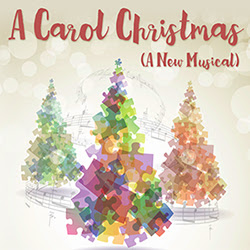Interview: Bruce Kimmel and Doug Haverty Discuss A CAROL CHRISTMAS
On November 16, a new musical version of A Christmas Carol entitled A Carol Christmas will open at Group Rep in North Hollywood. Doug Haverty wrote the book and Bruce Kimmel, the music and lyrics. Kimmel is also the director. In the conversation that follows both men discuss the new piece.
Bruce Kimmel, what are your challenges in directing this piece?
BK: As always with a large cast show in 99-seat theater, it's conflicts, endless conflicts. We tried to be clear up front but you just have to know that stuff is going to happen. Early on we cast a swing to cover stuff, so that's been helpful. Otherwise, it's just making sure that everyone is playing the same show, achieving the energy I know the piece needs, and keeping the staging and pace fluid and fast.
Did you work in close association with Doug (Haverty) in writing the musical numbers? Was it a true collaboration or did you fill in the music by yourself when the script was handed to you?
BK: We had a funny sort of collaboration. He came to me last year with the idea. I normally write by myself, but I thought it would be fun to let someone else do the book and I very much liked the idea of doing a feminized version of A Christmas Carol. He wrote a really long outline, which I read about two lines of and refused to read the rest, as I felt it was too detailed too early and I find, for me at least, that outlines put blinders on people. So, I had an idea for the opening number and asked him to write that sequence first. He presented me with a seventeen page opening scene, I figured out how the song would function within it and we whittled it down to about three pages of actual dialogue that gets done within the song. I love that sort of collaboration. I also knew right away that I wanted to write an anti-I Want song, since it's our female Scrooge. When we got the opening right, then everything was easier and followed pretty quickly. We had lots of food meetings at the Coral Cafe going through the script, cutting, focusing, all the usual stuff. So it was a true collaboration, although there were times I just knew a certain song would be good for a sequence and we'd shape the scene around it when that happened. Once the writing began in earnest, it all went very quickly.
Why do you think this Dickens piece is timeless and still so appealing?
BK: I think it's timeless and appealing because we've all known people like Scrooge (or in our show, Carol) or we've even been Scrooge-like ourselves. And I think people really respond to the fact that a grouchy old grump can see the error of his/her ways and change for the better and realize that nice is as wonderful a commodity as money.
Tell us about your cast..
BK: We were able to put together a wonderful cast using quite a few Group Rep members and going outside for only a few roles. A lot of people who would have normally auditioned for this already had holiday plans, which is why we ultimately had to have a few outside folks. The Group Rep was also gracious enough and trusting enough that they allowed me to bring in my set and costume people from Levi to do this show, which I very much appreciated. And because using a real onstage band wasn't feasible for budget reasons, I hired my long-time musical director, Richard Allen, to not only MD but to create the tracks for the show. They're really great and we have a great sound design team as well to make sure the balance is good, which is always the problem when using tracks.
We hope everyone will come out to spend the holidays with us - it's a very upbeat and fun show, perfect for the family. And these days, we'll take all the upbeat we can get.
Doug Haverty, tell us about the challenges of turning Scrooge into a woman and setting it today.
DH: There have been productions where Scrooge was played by a woman and there have been adaptations where Scrooge was a woman. Setting it in the present actually makes it easier to believe that a woman could be a business owner and have fallen into the trap of getting greedy as they try to run a company. One of my favorite things about the original is the three ghosts as well as the ghost of Marley. Somehow it's easier to accept ghosts in a story from hundreds of years ago in faraway London. I think we're more skeptical today. So, I've followed the same ghostly structure, but none of them are actual "ghosts." Jacob Marley (here named Joelle) has recently passed away and as part of her will has set this Christmas Eve adventure into play. We meet her via a pre-recorded DVD. So, in a way this character is reaching out from the grave, but not in a supernatural way. And the three visits she sets up are from people our Scrooge has already met: Ghost of Christmas past is a regressional therapist who hypnotizes our Scrooge/Carol and takes her back in time; our Ghost of Christmas present is an herbalist who dispenses a special, powerful tea that helps people see their lives with crystal clarity; and the Ghost of Christmas future is a Tarot card reader. What successful, modern day mogul does not consult the Tarot?
Tell us about your past associations with Dickens at Group Rep.
DH: In 2009, we did a newer musical version at Group Rep (under the direction of then Artistic Director, Ernest Figueroa). It was unusual, poetic with lots of additional Dickensian prose culled from other essays. The ghosts were puppets. I played Bob Cratchit and it was so gratifying to tell this story during the holidays. So, I thought I would try to make a new musical version and make it contemporary. While it's wonderful escapism to go back to jolly old England and watch Scrooge in despicable action, there's definitely a separation. We think, "Oh, there's no one that extreme nowadays." And that got me thinking. Are there people out there who would never consider themselves a "Scrooge," and I think that maybe there are.
Many of my plays have female protagonists, so I thought it would be fun to explore that. I know there are adaptations where Scrooge has been turned into a woman. But I wanted to go a step further; I've taken all the major characters from the short story and made them women. And our Scrooge, Carol, does not see herself as a penny-pincher. She is just a driven, successful female entrepreneur who has been forced to be stingy with her time. And she ultimately learns (by visiting the past, looking deeper into the present and looking ahead) that she can be even more successful if she immerses herself into the lives of the people working for her and to enjoy life and its simple pleasures.
Our Carol/Scrooge does not hate Christmas, per se, she doesn't like the slow down and apathy that accompanies the holidays. People start being less productive because of "the holidays." In her I Want song, she suggests that Christmas come every four years (like Olympics and elections) so they'd be more special. I'm hoping that people today will actually identify with her.
Why does the Dickensian plot grab people year after year?
DH: Many people have said that it's the perfect plot. You have a major character who just wants to be left alone and then has an epiphany and realizes the life he's missing and that there's great joy in generosity. We all love a major change in a character and there's great fun in knowing the story and seeing him gradually learn and change. We've tried to follow this plot carefully with (hopefully) just a few new curves to let it have its own flavor.
What do you think is the takeaway?
DH: This is like watching a story we all know and love and seeing it dressed up in new surroundings. I hope people find it refreshing. There's so much negativity out in the world, I wanted to offer something affirming, charming, comfortable and moving. I've always had a soft spot for Tiny Tim, his bravery and appreciation of the smallest gifts. I love the way Scrooge's heart melts when he realizes Tim's plight and the bond that is formed between the two. In our story, Tim is Trina and she is similar in the plight and how she bonds with Carol/Scrooge.
Are you happy with Bruce Kimmel's music?
DH: Bruce Kimmel's songs are pure magic. They're all beautifully crafted with a wry sense of humor. Sometimes we see new musicals and the songs all sound alike. That is definitely not the case here. Kimmel's songs are all unique, catchy and winning. I predict that audiences will love this music.
Anything you care to add?
DH: I hope that people leave the theater with renewed hope and refreshed and look at their own lives and appreciate what they have and ask themselves if there's anything they could do to improve the lives of people around them. Change is refreshing and the joy contagious.
Videos




